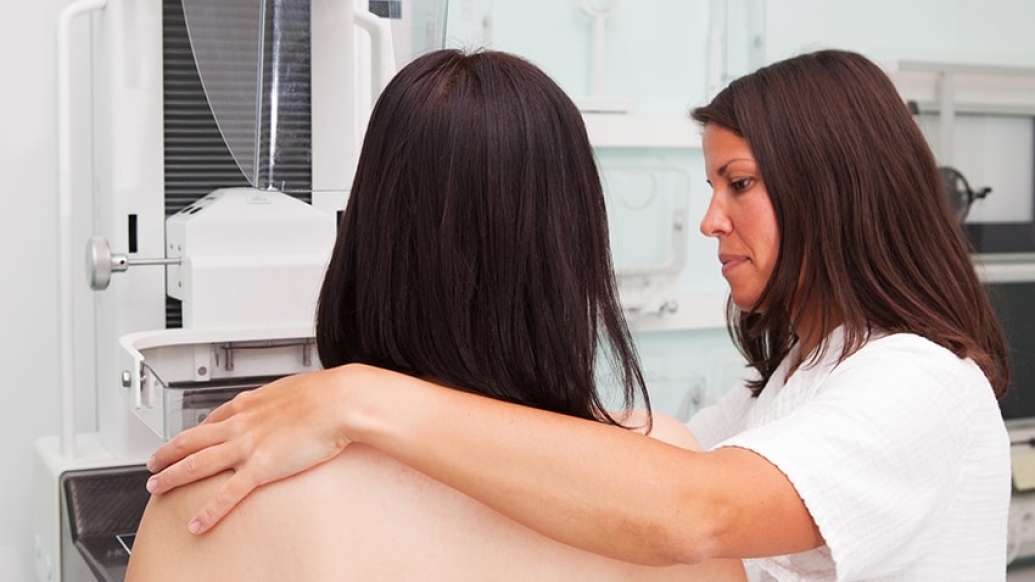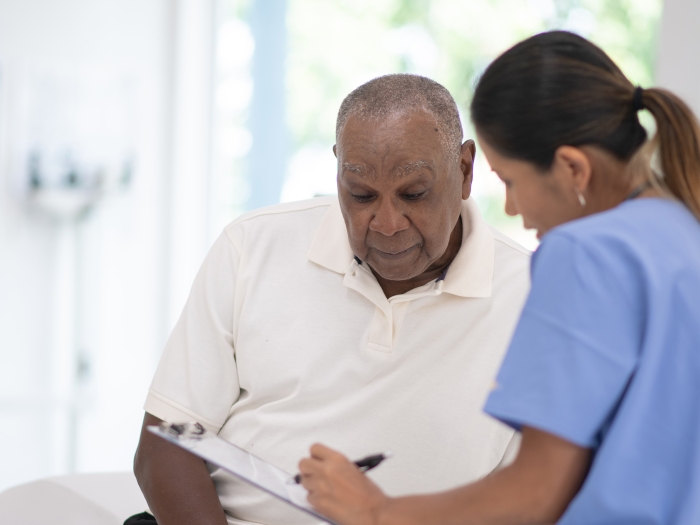All women should know about their breast cancer risk — a factor that varies with age and family history. Learn about when, how and why to get screened.
7:00 AM
Author |

Different health care organizations have adjusted their recommendations for breast cancer screening in recent years. That has led to confusion about whether annual mammograms are necessary for women over 40 — and whether women should do self-exams of their breasts.
LISTEN UP: Add the new Michigan Medicine News Break to your Alexa-enabled device, or subscribe to our daily audio updates on iTunes, Google Play and Stitcher.
Although guidelines may vary, all doctors agree that mammograms can be lifesaving.
"The risk of not screening is worse than a false positive exam that may cause temporary anxiety. Metastatic breast cancer is worse," says Colleen Neal, M.D., division director of breast imaging at the University of Michigan Rogel Cancer Center.
Her advice: Be breast self-aware.
"Everyone should pay attention to their bodies and keep an eye on any new symptoms that could be related to breast cancer," Neal says.
The most common symptoms of breast cancer are a lump or mass, skin changes, nipple discharge and retraction of the nipple.
Screening guidelines for breast cancer vary depending on your age, family history and other risk factors, such as genetic links to cancer.
The Rogel Cancer Center follows guidelines set by the National Comprehensive Cancer Network, which recommends the following steps for women with average risk:
Breast cancer screening for average-risk women
Women ages 25 to 39
- Have a breast exam by your doctor every one to three years
- Pay attention to any changes to your breasts
- Ask your doctor for a breast cancer risk assessment
Women 40 and older
- Have a breast exam by your doctor every year
- Pay attention to any changes to your breasts
- Ask your doctor for an ongoing breast cancer risk assessment
- Have a screening mammogram annually
The NCCN has long recommended annual mammograms for women 40 and older because this saves the most lives of patients with breast cancer and gains the most life years for patients who have been treated.
MORE FROM MICHIGAN: Sign up for our weekly newsletter
Even though women are more likely to get breast cancer as they age, "20 percent of our breast cancer patients are diagnosed under the age of 50," Neal says. "These women have the most life years to lose."
Breast cancers that are found early with screening mammography have higher rates of survival.
There is no specific upper age limit for healthy women to have a screening mammogram. According to the American Cancer Society, screening should continue as long as a woman is in good health and is expected to live 10 years or longer.
If you're healthy, get a mammogram unless your doctor says otherwise.
Breast cancer screening for high-risk women
Women at high risk of breast cancer, such as those with a family history, should have additional surveillance. NCCN guidelines for women with high breast cancer risk advise the following:
Women 35 and older
- Have a breast exam by your doctor every six to 12 months
- Pay attention to any changes to your breasts
- Ask your doctor for risk-reduction strategies
- See a genetic counselor to identify any genetic links to cancer
- Have a mammogram annually
- Consider a 3D mammogram, called tomosynthesis
Women with a lifetime breast cancer risk higher than 20 percent should follow all of the guidelines above and have an annual breast MRI.
SEE ALSO: A Radiologist Explains What to Expect at Your First Mammogram
Regarding self-exams, Neal does not discourage them.
"If you're breast self-aware, that's how you'll know there has been a change. If a woman does do self-exams, I recommend doing it at the same time each month, such as day seven of your cycle. Being consistent will let you identify a change should one arise," Neal says.
If you've been told you have dense breast tissue, learn about your breast cancer risk.
Tests that screen for breast cancer
Several tests and imaging techniques are used to screen for or detect breast cancer:
Mammogram: An X-ray image of your breast to find abnormalities such as masses and other signs of cancer.
Tomosynthesis: An advanced three-dimensional mammogram that studies breast tissue in "slices" and may help detect cancer in women with dense breast tissue.
Ultrasound: Used to determine whether a mass is solid or filled with fluid. Cancer is solid, though not all solid masses are cancerous.
Magnetic resonance imaging (MRI): Creates a full image of your breast by combining images from many angles. Used mostly in high-risk patients or to provide more information after cancer has been detected.
Breast cancer facts and statistics
No one wants to be a statistic, but knowing basic breast cancer facts can help you understand the prevalence of the disease and who should be most concerned and vigilant about breast screening.
Here's why all women should take note:
- Approximately 1 in 8 women will be diagnosed with breast cancer in their lifetime. That's a little more than 12 percent. It might not seem like much, but thinking about your eight closest friends puts it in perspective. Chances are, at least one of your friends will be diagnosed and receive treatment.
- Even though a woman's risk of breast cancer almost doubles if it runs in her immediate family, about 75 percent of diagnosed women have no family history of breast cancer.
- In 2018, an estimated 266,120 women will be diagnosed with breast cancer, according to the American Cancer Society. An estimated 40,920 will die from it. Breast cancer is one of the leading causes of cancer death in women.
- Men can get breast cancer, too. About 1 in 1,000 men will be diagnosed in their lifetime.
Schedule a mammogram at Michigan Medicine. For more information, call the Cancer AnswerLine at 800-865-1125.

Explore a variety of health care news & stories by visiting the Health Lab home page for more articles.

Department of Communication at Michigan Medicine
Want top health & research news weekly? Sign up for Health Lab’s newsletters today!





